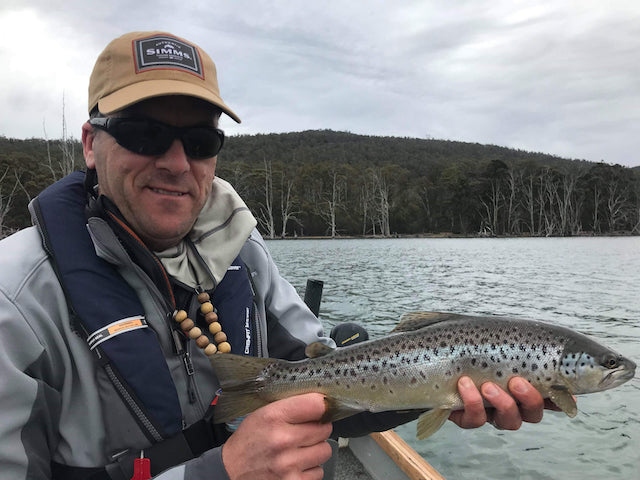October 10, 2019How To Fly Fish
Straight from the Pros - Jonothan Stagg's Three Hot Tips

Jonothan started fly fishing at the age of 11 and has now over 30 years’ experience fishing in his home of Tasmania. He has fished a number of mainland states as well as New Zealand, USA and many countries in Europe and Great Britain. He is the current and 6 times Tasmanian Fly Fishing Champion, three times Australian Fly Fishing Champion as well as the current and three times runner up silver medalist. He was a member of gold medal winning Australian teams in both Commonwealth and Oceania Championships. Jonothan has been an Australian team member in 10 World fly fishing Championships, finishing in the top 20 individuals on 4 occasions.
Jonothan Stagg's thee hot tips on becoming a better fly angler are:
- CHOOSING THE LENGTH OF TIPPET: For me the tippet is one of the most critical items in all my fly fishing equipment. It plays a massive part in your cast as to how your fly will be presented as well as being that final link between you, your fly and the fish. For many people having a leader and tippet that turns over a fly well is all that they are looking for. But there is so much more that can aid with presentation of your flies by simply lengthening or shortening a leader tippet or even changing the diameter. My advice is don’t be scared to go longer with a tippet, sure it is not easy to cast at first but that’s why you should practice. Get used to it as the presentation of your flies will improve dramatically if you can learn to cast longer tippets. Curve casts, mending, downstream and upstream presentation will all be better with a long tippet. Experiment, adjust the length, change the diameter and find out what works best in the different situations you encounter.
- PLAYING AND NETTING THE FISH: In competition fly fishing a fish that has been caught must be presented in the net to the controller for measuring. This means that no matter how beautiful that presentation of the dry fly was, and how well the trout ate the fly, and how you fought the fish downstream for 5 minutes, and how well you played the fish to the net. If that fish comes off as you are about to lift the net under it and it swims away, that fish does not count! So that being said, getting that fish in the net is pretty important! As competition fishing is with barbless hooks my first advice is keep tension on the fish at all times, be smooth and do your best to stop the fish from jumping. If the fish gets slack line this is often when it comes off. Try to play the fish in one direction. If you hook a fish striking backhand then try and play it from the back hand all the way to the net, changing the rod angle or direction you play the fish means you are pulling on the hook in a different direction which may make it come out. Don’t rush. You may think you are wasting time playing fish for too long but a fish in the net will go on the score card so be willing to take that little bit extra time. So many fish come off when you rush them to the net, be sure they are ready and always try to bring the fish upstream of you to be netted . Pulling a fish to the net from downstream will often end in disaster.
- THE IMPORTANCE OF GOOD WADING BOOTS: There is nothing worse than fishing a competition session on a river slipping all over place and spending more time trying to stand up than fishing. It is critical to have the best sole on your wading boots to suit the water. For free stone rivers I generally like felt soles as I find these grip well on the smooth rocks and are also quiet which I like. However for long hikes, silt bottomed or grassy river banks felt soled boots are a disaster as you will be slipping over for sure. For this a rubber or studded boot sole would be recommended such as the new Simms Flyweight wading boots, these are incredibly light and comfortable boots. There are many options out there which are better for some types of water than others but my main advice is to use appropriate soles and comfortable wading boots. Being stable in the water is crucial to successful fishing in any situation.

